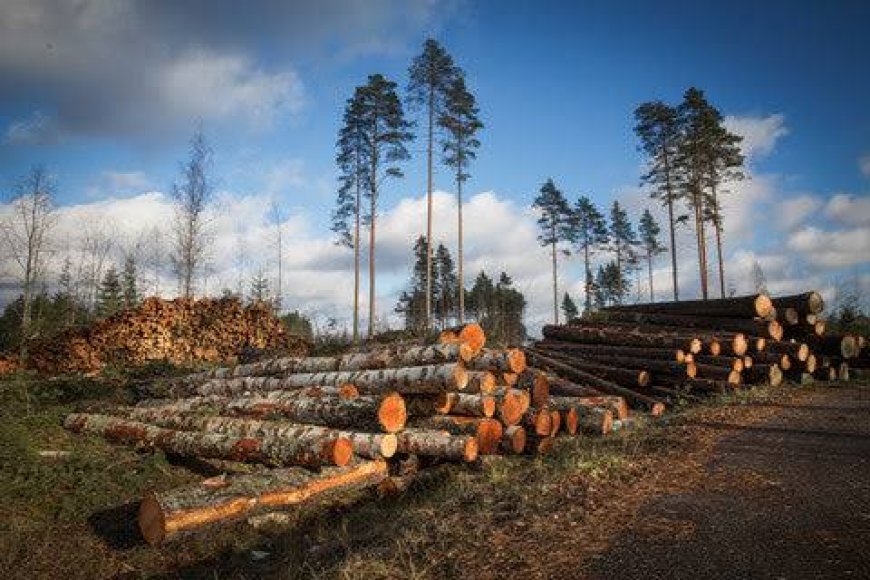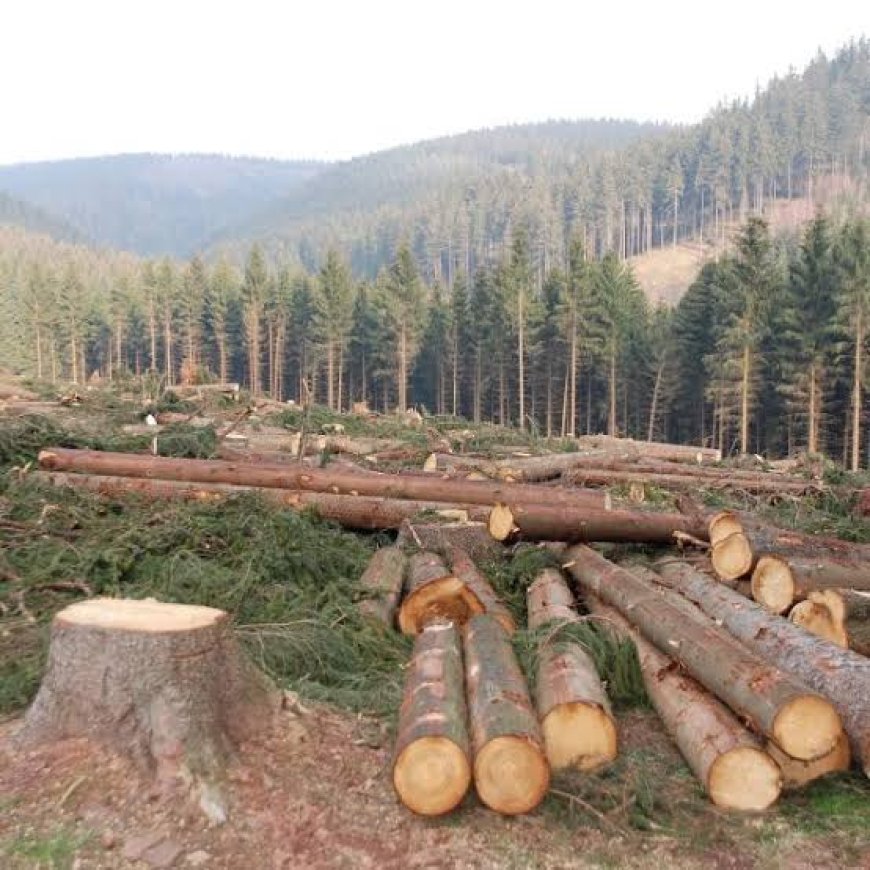THE EFFECT OF DEFORESTATION ON BIODIVERSITY
This article explores the severe impact of deforestation on biodiversity, highlighting how forest loss disrupts ecosystems, drives species extinction, and contributes to climate change. It discusses the importance of biodiversity, the environmental and health effects of deforestation, and emphasizes sustainable solutions to mitigate these impacts globally and locally, including in countries like Nigeria.<meta name="description" content="Explore the impact of deforestation on biodiversity, climate change, and human health. Learn how forest loss leads to species extinction and what actions can help protect our ecosystems." />
Deforestation otherwise known as forest clearance is the removal and destruction of a forest, or stand of trees from land that is then converted to non- forest use.
Deforestation is driven by many things such as infrastructure development, agricultural expansion and resource extraction which is largely influenced and propelled by urbanization.
Forests help make the planet livable for us all, but human activity is destroying them at an alarming rate. Deforestation represents a growing threat to all life on earth, driving dangerous carbon emissions and exacerbating the climate crisis.
The slow and steady eradication of rich lush forests contributes immensely towards our global diversity crisis and this article will provide key information on deforestation and its impact on biodiversity.
WHAT IS BIODIVERSITY?
Biodiversity refers to the variety of life on earth, including the diversity within species, between species, and of ecosystems. Forests, especially tropical rain forests, are home to more than 80% of terrestrial species.
Biodiversity is not only important for its own sake but also for the benefits it provides to humans and the plant. It supports many ecosystem services that are essential for human well being such as food production, climate regulation, disease control and cultural values. According to the United Nations Environment Programme ( UNEP), the economic value of ecosystem services provided by biodiversity is estimated at US $125 trillion per year.
WHY IS BIODIVERSITY IMPORTANT?
Biodiversity is one of the most precious and important things we have and we humans tend to think of it as just something nice to look at or even take pictures of but it is vital for so much more without biological biodiversity, our entire support system for humans and all living things would be in crisis. We rely heavily on nature to provide food, clean water, medicines, prevent flooding and other extreme weather effects.
HOW SERIOUS IS THE IMPACT OF DEFORESTATION ON BIODIVERSITY?
The impact of deforestation on biodiversity has caused potential damage on nature over the years and understanding the gravity of this impact is very crucial.
When forests are cleared, it leads to more carbon in the atmosphere which can contribute to global warming. It also disrupts water cycles and affects people who depend on the forests for their food, clean water and shelter.
The most direct consequence of deforestation on biodiversity is habitat loss. Species that are highly specialized or endemic to certain regions often cannot survive outside their natural habitats for example the Sumatran orangutan which lives in the tropical forests of Indonesia has seen its population diminish due to logging and the expansion of palm oil plantations. Once these habitats are cleared, the animals face starvation and decreased reproductive success.

Sumatran orangutan.
Another significant effect of deforestation on biodiversity this time, is targeted at humans as the loss of forests have led to a rise in human disease. A growing body of scientific evidence shows that the felling of tropical forests creates optimal conditions for the spread of mosquito-borne scourge, including malaria and dengue. Primates and other animals are also spreading disease from cleared forests to people. A very visible case was discussed in the Journal of Emerging Infectious Diseases, with researchers documenting a rise in human malaria cases in the region of Malaysian Borneo undergoing rapid deforestation
One of Nigeria's primary drivers of deforestation is the rapid expansion of agriculture. Many people in Nigeria rely on agriculture as a source of income, but expanding farmland has led to a significant loss of forests. Another significant cause of deforestation in Nigeria is logging, both legal and illegal, which is linked to corruption and weak law enforcement. Finally, urbanisation is also a major cause of deforestation in Nigeria, as cities continue to grow and expand, leading to the destruction of forests in urban areas.
In 2023, there were reports of zoonotic disease outbreaks in East Africa including the Ebola epidemic in Uganda at the beginning of the year and the Marburg virus breakout in Tanzania in March. These viruses lead to serious ill health and frequent result in high death rates.
ENVIRONMENTAL EFFECTS OF DEFORESTATION
Deforestation affects climate change by releasing greenhouse gases, a major cause of global warming. Trees are major carbon sinks, meaning that they naturally absorb more carbon than they release. On average, forests absorb more than twice the carbon they emit. When trees are cut or burned down, they stop absorbing carbon and the carbon stored in their wood is released into the atmosphere.
Deforestation also results in food scarcity since native people who obtain food and medicines from forest plant species or grow rare crops in this forest deprives them of the resources they need to cultivate food to survive intimately leading to food insecurity.
Another major effect of deforestation is soil erosion. Tree roots help to stabilize and keep the soil in place but the removal of these forest trees exposes the soil to destructive winds and rain especially in areas which are highly prone to natural disasters.
In Iran, researchers investigated the effect of deforestation on loess (a mineral-rich soil layer composed of dust and silt. They discovered that agriculture, livestock grazing and wood usage all contributed to deforestation in the northeastern region of the country which led to loss of soil nutrient.
Forest trees also help with flood control during intense rainfall; their roots keep the soil in place while still absorbing some of the rainwater.
In October 2022, the Philippine president blamed years of deforestation for the tragic mudslide that obliterated a mountain-top community during heavy rainfall, causing over 130 fatalities.
These few highlighted points and so many other impacts of deforestation for the purpose of urbanization, and productions such as paper, palm oil, mining, and illegal logging are some of the many reasons for deforestation but while urbanization has brought growth and progress, it has also cost biodiversity massive losses over the years.
HOW CAN THESE IMPACTS BE MITIGATED?
With this awareness and understanding of how much damage deforestation can cause to both the present and future, we can take informed actions to prevent further damage by promoting sustainable land use practices, and protect the vital services the forest can provide like clean air, water, and carbon storage.
The destruction of forests around the globe poses a risk not only to wildlife but to multiple ecosystems, with an impact on our health and an acceleration in global warming. Although the forest conservation programs of various nations have led to an increase in forest areas, this is currently not enough. Such efforts need to multiply with more countries engaging in saving forests and planting new trees, thus forming new ecosystems and new habitats for various animals and plants.
In conclusion, deforestation will continue to be one of the most urgent environmental challenges of our time. Protecting forests is not just an ecological responsibility but a necessary step toward a sustainable and resilient future.










